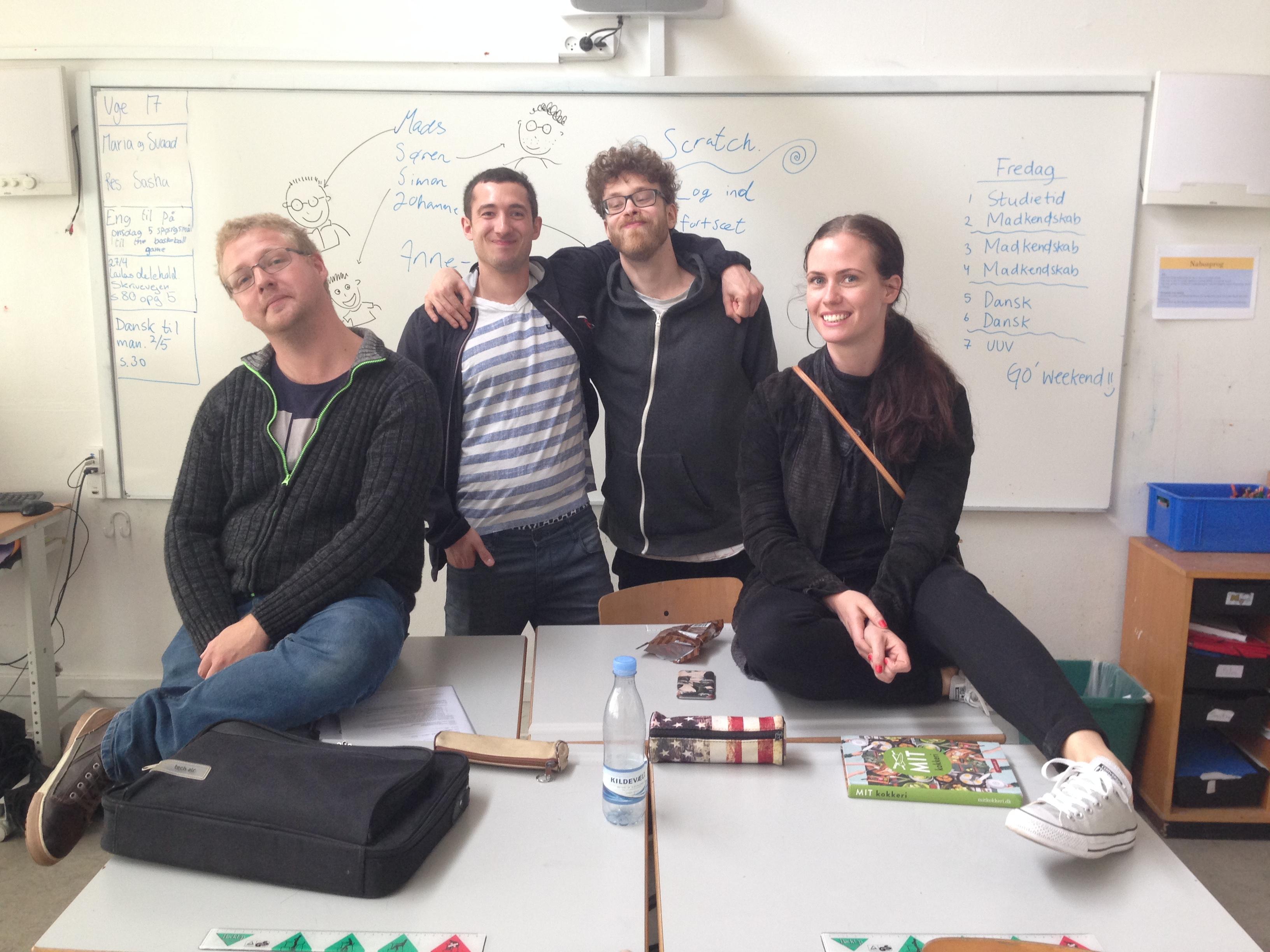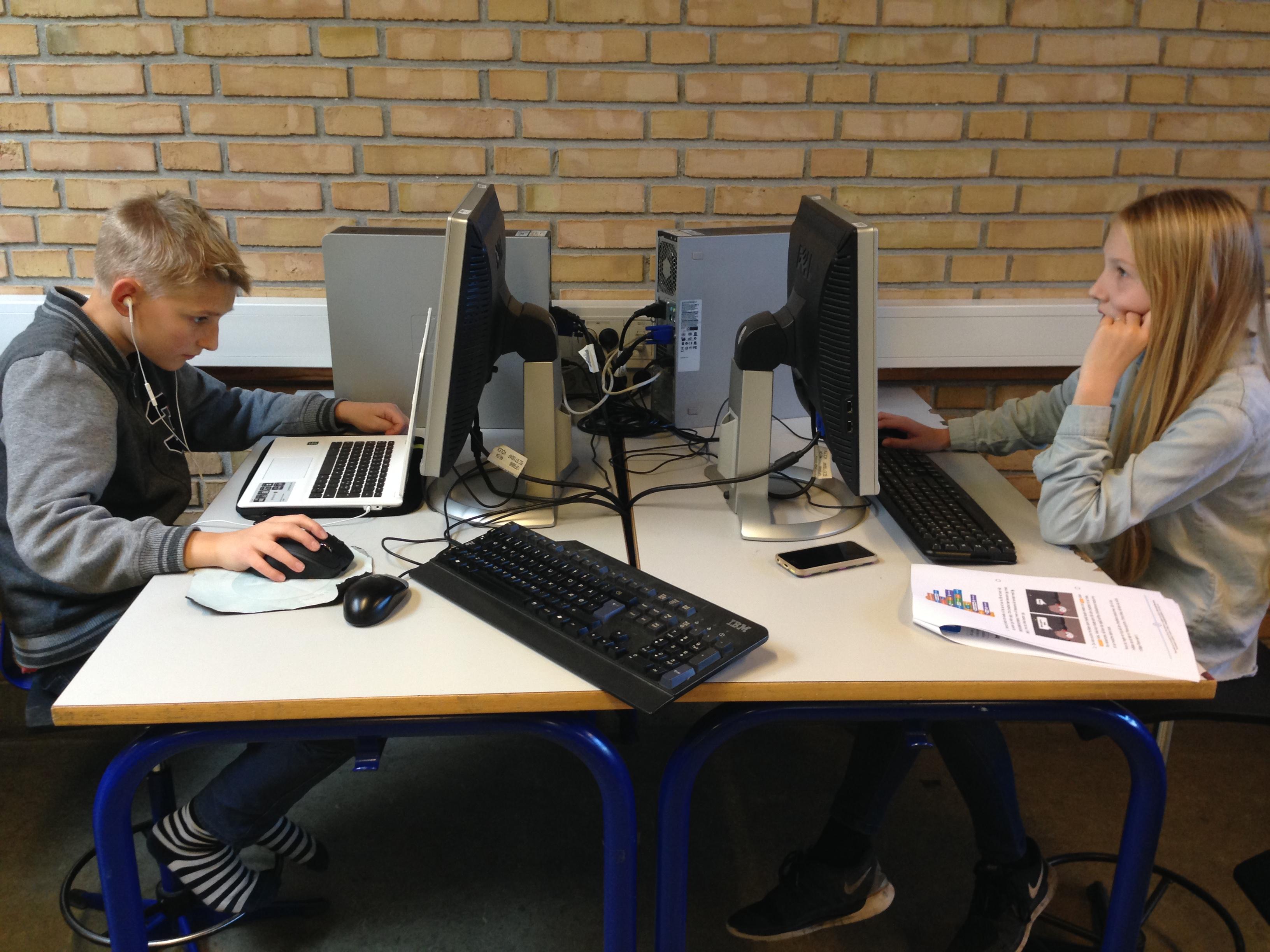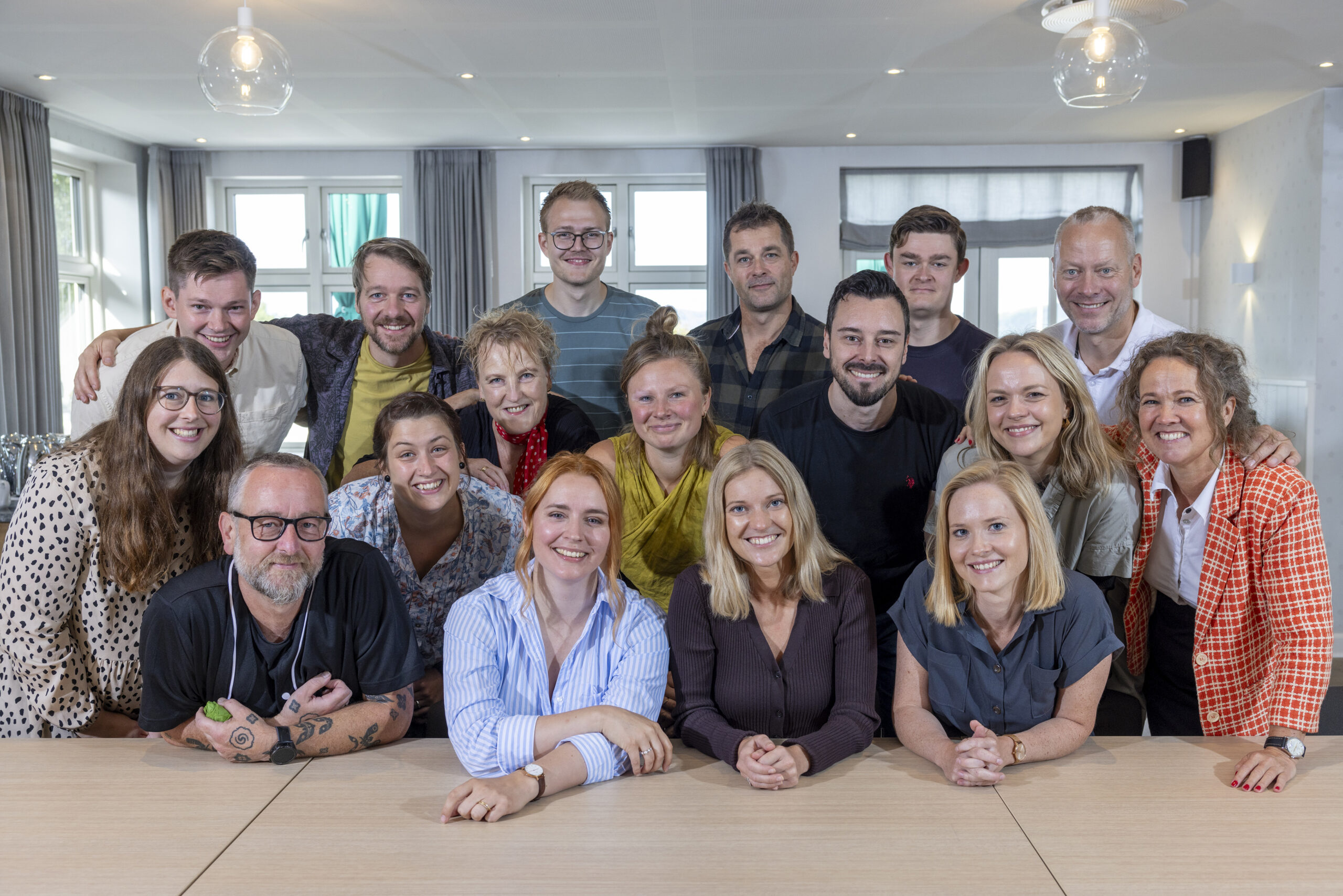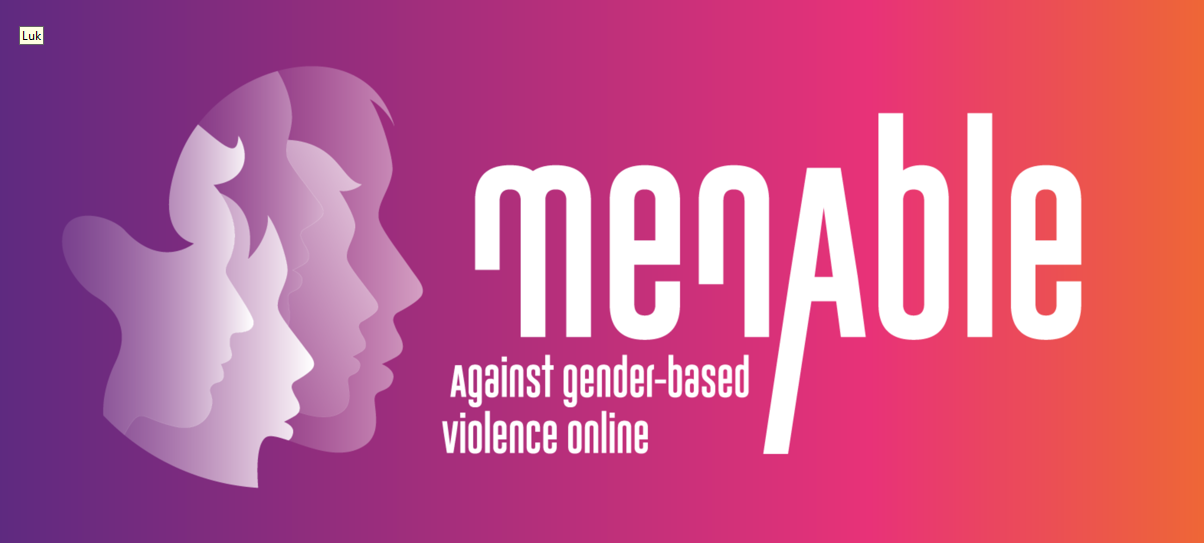The first year of Code Club in Denmark
By Anne Kathrine Kolby, project coordinator, Code Club.

Teachers
Our experiences from our pilot project show that Code Club creates dialogue and learning between children and youth, and their teachers, regarding IT, coding, and digital behaviour. Code Club has proved useful in providing skills upgrading of teachers and management in our select schools. The schools were eager to implement Code Club in their teaching in which they saw many professional advantages.Students
[caption id="attachment_14970" align="alignright" width="261"] Code Club at the school of Kragelund.[/caption]
Elementary school students, participating in Code Club, showed great interest and commitment in their implementation of Code Club tasks, and with involving themselves in dialogue about the use of IT and media. Our five different schools set up Code Club in e.g., Danish and math lessons.
One of the Code Club courses took place in a special class whose purpose was to present the students with a different way to learn and motivate. This proved a great success, and opened the teachers’ eyes to new possibilities for including particularly vulnerable and literary challenged young people in their teaching.
Code Club at the school of Kragelund.[/caption]
Elementary school students, participating in Code Club, showed great interest and commitment in their implementation of Code Club tasks, and with involving themselves in dialogue about the use of IT and media. Our five different schools set up Code Club in e.g., Danish and math lessons.
One of the Code Club courses took place in a special class whose purpose was to present the students with a different way to learn and motivate. This proved a great success, and opened the teachers’ eyes to new possibilities for including particularly vulnerable and literary challenged young people in their teaching.
Volunteers
The Code Club project challenged several different models for including volunteers. First of all, it proved time-consuming coordinating the work schedule of our many volunteers. Also, it was challenging to enlist Code Club volunteers at all due to the fact that Code Club teaching is scheduled in the daytime during weekdays. [caption id="attachment_15308" align="alignleft" width="294"] Students of social education at the school of Katrinebjerg.[/caption]
However, we do regard volunteers a relevant component to Code Club as they comprise solid and committed aid that may carry Code Club forward and greatly motivate teachers as well as students. Our most successful model for including volunteers- a model which will also be our recommendation for future Code Clubs in Denmark – was our collaboration with University College VIA, Social Education, in the city of Aarhus.
11 students from University College VIA’s elective module “Media and digital culture” participated as volunteer teachers of Code Club. Involving VIA students – professionally qualified to set up a pedagogical framework for children and also to create interesting media-related teaching – was incredibly constructive and inspiring. Furthermore, we needed only coordinate our contact with our 11 volunteers through one lecturer at University College VIA, Social Education, which made coordination much easier. Another benefit by including students of social education was a case of upskilling. By teaching Code Club, students acquired insight into how coding may be incorporated in a professional context, and technically they increased their skill levels through their work with elementary school students and through their understanding of Code Club tasks.
Students of social education at the school of Katrinebjerg.[/caption]
However, we do regard volunteers a relevant component to Code Club as they comprise solid and committed aid that may carry Code Club forward and greatly motivate teachers as well as students. Our most successful model for including volunteers- a model which will also be our recommendation for future Code Clubs in Denmark – was our collaboration with University College VIA, Social Education, in the city of Aarhus.
11 students from University College VIA’s elective module “Media and digital culture” participated as volunteer teachers of Code Club. Involving VIA students – professionally qualified to set up a pedagogical framework for children and also to create interesting media-related teaching – was incredibly constructive and inspiring. Furthermore, we needed only coordinate our contact with our 11 volunteers through one lecturer at University College VIA, Social Education, which made coordination much easier. Another benefit by including students of social education was a case of upskilling. By teaching Code Club, students acquired insight into how coding may be incorporated in a professional context, and technically they increased their skill levels through their work with elementary school students and through their understanding of Code Club tasks.
Challenges
The coordinated effort between schools, collaborators and volunteers is time-consuming. A lot of dates and schedules must work together, and coordinating and planning, for instance meetings and schedules dedicated to Code Club, has proven to be a longer process. So, it is of utmost importance that one enters into an early dialogue with schools and students, in order that time is set aside for planning, and thus creating the best foundation possible for organising Code Club courses. Among others, it is important that students of social education have the opportunity to meet with teachers of a given elementary school before launching Code Club, so that expectations to how Code Club should be implemented, may be matched. At some schools, it has been challenging and time-consuming to motivate and commit teachers to teach Code Club. At the same time, on most schools we experienced a great interest in coding becoming part of teaching. Though, we also saw a good amount of insecurity and lack of IT-skills with teachers.Recommendations
[caption id="attachment_15322" align="alignright" width="269"] Code Club at the school of Beder[/caption]
As part of our pilot project objectives, we have gathered our experiences on Code Club’s (Danish) website. Teachers, interested in Code Club, will find experiences from our pilot project, teaching material, and an introduction to how someone, as a teacher, may start running Code Club. Code Club has proven to be a sustainable model which may be rolled out by anyone who is interested.
However, from our experience speaking to teachers, there is still a good way to go before teachers, themselves, and their managers, venture into using coding as a natural part of teaching. We have set up the frameworks so that Code Club potentially may be rolled out to all elementary schools in Denmark, but teachers need help and support to be able to include coding in their various courses, such as Danish, math, and science, along with actually implementing coding in their teaching. Therefore, we are recommending an upscale of the pilot project to consist of a national initiative, running for the next three years, qualifying teachers and students to use coding in their teaching. A close collaboration between elementary schools, teacher educations, social educations, and other initiatives within the field, including project Coding Class of The Danish IT Industry Association which aims to research and document coding in elementary schools.
With regards to an upscale model, we recommend that resources are set aside to measure the effect of Code Club teaching including what, and how much, students have learned from participating in Code Club.
Learn more our experiences from Code Club’s first year in Denmark in Centre for Digital Youth Care’s compilation (in Danish).]]>
Code Club at the school of Beder[/caption]
As part of our pilot project objectives, we have gathered our experiences on Code Club’s (Danish) website. Teachers, interested in Code Club, will find experiences from our pilot project, teaching material, and an introduction to how someone, as a teacher, may start running Code Club. Code Club has proven to be a sustainable model which may be rolled out by anyone who is interested.
However, from our experience speaking to teachers, there is still a good way to go before teachers, themselves, and their managers, venture into using coding as a natural part of teaching. We have set up the frameworks so that Code Club potentially may be rolled out to all elementary schools in Denmark, but teachers need help and support to be able to include coding in their various courses, such as Danish, math, and science, along with actually implementing coding in their teaching. Therefore, we are recommending an upscale of the pilot project to consist of a national initiative, running for the next three years, qualifying teachers and students to use coding in their teaching. A close collaboration between elementary schools, teacher educations, social educations, and other initiatives within the field, including project Coding Class of The Danish IT Industry Association which aims to research and document coding in elementary schools.
With regards to an upscale model, we recommend that resources are set aside to measure the effect of Code Club teaching including what, and how much, students have learned from participating in Code Club.
Learn more our experiences from Code Club’s first year in Denmark in Centre for Digital Youth Care’s compilation (in Danish).]]>



Hvis du vil sætte et par ord på din feedback, vil det hjælpe os rigtig meget til at forbedre vores indhold.